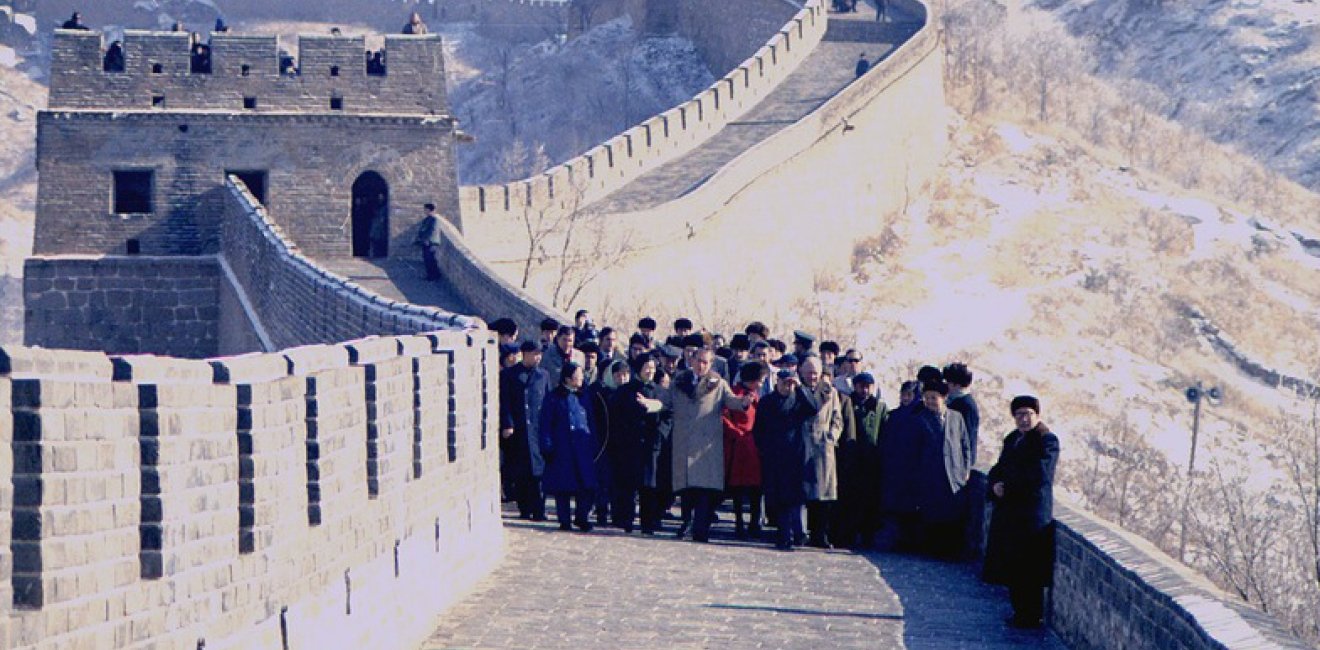Nixon Goes to China
When Nixon went to China, hed affirms it was one country.

A blog of the History and Public Policy Program
When Nixon went to China, hed affirms it was one country.

Nixon goes to China, and affirms it's one country
Forty-five years ago this week, Richard Nixon arrived in Beijing and became the first American president to visit the People's Republic of China. Relations with the communist state had been antagonistic since its founding in 1949. When Nixon visited in 1972, the United States still recognized the defeated Nationalist Party, or the Guomindang (Kuomintang), as the legitimate government of China--despite that the Nationalists had retreated to Taiwan and no longer controlled any territory on the Chinese mainland.
Nixon's visit to China jumpstarted the process of normalizing relations between the PRC and the United States. It also pushed Washington to distance itself from Taiwan. In Nixon’s conversations with Prime Minister Zhou Enlai, he listed five principles which were to form the basis of future American policy on this still contentious issue:
Nixon: …Principle one. There is one China, and Taiwan is a part of China. There will be no more statements made—if I can control our bureaucracy— to the effect that the status of Taiwan is undetermined.
…Second, we have not and will not support any Taiwan independence movement.
Third, we will, to the extent we are able, use our influence to discourage Japan from moving into Taiwan as our presence becomes less, and also discourage Japan from supporting a Taiwan independence movement…
The fourth point is that we will support any peaceful resolution of the Taiwan issue that can be worked out. And related to that point, we will not support any military attempts by the Government on Taiwan to resort to a military return to the Mainland.
Finally, we seek the normalization of relations with the People's Republic. We know that the issue of Taiwan is a barrier to complete normalization, but within the framework I have previously described we seek normalization and we will work toward that goal and will try to achieve it.
Later in their conversation, Nixon frankly laid out his domestic political calculus on Taiwan:
Now, the Prime Minister [Zhou Enlai] as a sophisticated observer of the American political scene, could very well interpret what I have said as being a self-serving statement, and solely devoted to assuring my political survival. I would simply respond by saying that there is something much more important than whether I am around after November this year or January next year, and that is the whole American-Chinese initiative. That is what is involved.
So what we need to do, and what we are trying to find is language which will meet the Prime Minister's need, but language which will not give this strong coalition of opponents to the initiative we have made, that we have talked about, the opportunity to gang up and say in effect that the American President went to Peking and sold Taiwan down the river.
The difficulty is that as you get into the political campaign, and as critics join in, not because they are for Taiwan but because they oppose the American-Chinese initiative, as they join together, the debate will force both candidates to assure the American public on this issue. This we must not let happen if we can avoid it.
Now I would like to come back to Taiwan with the Prime Minister's permission, after I have had the opportunity to discuss world views. I know this will take some time. Since Dr. Kissinger and the Deputy Foreign Minister had an interesting conversation today, I want the Prime Minister to know why we seem to be, shall we say, difficult on this issue. It is not because of a fatuous argument but because we see here a danger to the whole initiative. Our problem is to be clever enough to find language which will meet your need yet does not stir up the animals so much that they gang up on Taiwan and thereby torpedo our initiative. That is our goal.
I will simply sum up by saying I do not want to be forced when I return to the United States, in a press conference or by Congressional leaders, to make a strong basically pro-Taiwan statement because of what has been said here. This is because it will make it very difficult to deliver on the policy which I have already determined I shall follow.
At the conclusion of the visit, the two sides released a joint statement, the Shanghai Communiqué, and pledged to continue working toward the normalization of relations.



